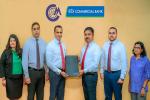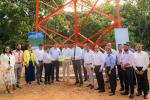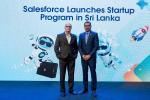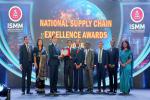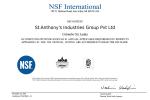Themed “Public-Private Collaboration for Standards Evolution,” the seminar provided officials from public sector institutions and the private sector food and beverages industry with valuable insights into the global standards development process.
Aligned with the project’s goal of enhancing Sri Lanka’s National Quality and Standards ecosystem, the seminar equiped Sri Lankan officials engaged in standards development to actively participate in international standards setting fora that are responsible for developing standards for the constantly evolving industry and reviewing the suitability of the existing ones.
One of the focal points of the seminar was the importance of fostering public-private partnerships in standards development.
Dr. Johann Hesse, Head of Cooperation at the EU Delegation to Sri Lanka and the Maldives, highlighted the significance of collaboration in modernizing the food control system to meet international standards.
"By aligning the efforts of both the public and private sector and recognizing each other's contributions, Sri Lanka will benefit from developing standards that promote sustainable economic growth and global competitiveness,”
The project shared insightful case studies and highlighted successful collaborative efforts between industry stakeholders and regulatory bodies.
It facilitated an engaging discussion, enabling stakeholders to explore opportunities and challenges in the standards development processes, paving the way for future collaboration.
The seminar, therefore, provided a platform for meaningful discussions on standards development processes and facilitated exchanges of ideas between the public and private sectors.
Dr. Siddhika G. Senaratne, Director General of the Sri Lanka Standards Institution (SLSI), making the opening remakes at the seminar, emphasised the critical nature of collaboration between public and private sectors in addressing evolving challenges within the agri-food sector.
"Through continued cooperation, we can ensure that standards remain relevant and effective in meeting the needs of industry, government, and consumers."
Prior to the seminar, the project conducted a three-day training programme for more than 60 officers of SLSI on best practices in standards development, the standardization mechanism of the International Standards Organization (ISO) standards, and establishing and operating National Mirror Committees (NMC).
Dr. Jairo Villamil-Diaz, International Senior Specialist at UNIDO, underscored the crucial role of standards in today's rapidly evolving industrial landscape ensuring product quality, safety, and interoperability.
“The seminar provided an enabling platform for stakeholders to exchange ideas and best practices in standards development.
By fostering collaboration between industry and regulatory bodies, we can create standards that are not only effective but also responsive to the needs of diverse stakeholders."
Mr. Sanath Mendis, the National Food Safety Expert of UNIDO and a former Director General of SLSI, elaborating on the ‘Quality and Standards Ecosystem’, reiterated the importance of establishing a National Quality Council, which is an imperative to economic development.
The workshop concluded with a commitment from participants to continue working together to advance standards development efforts, contributing to sustainable industrial growth and fostering global competitiveness.
